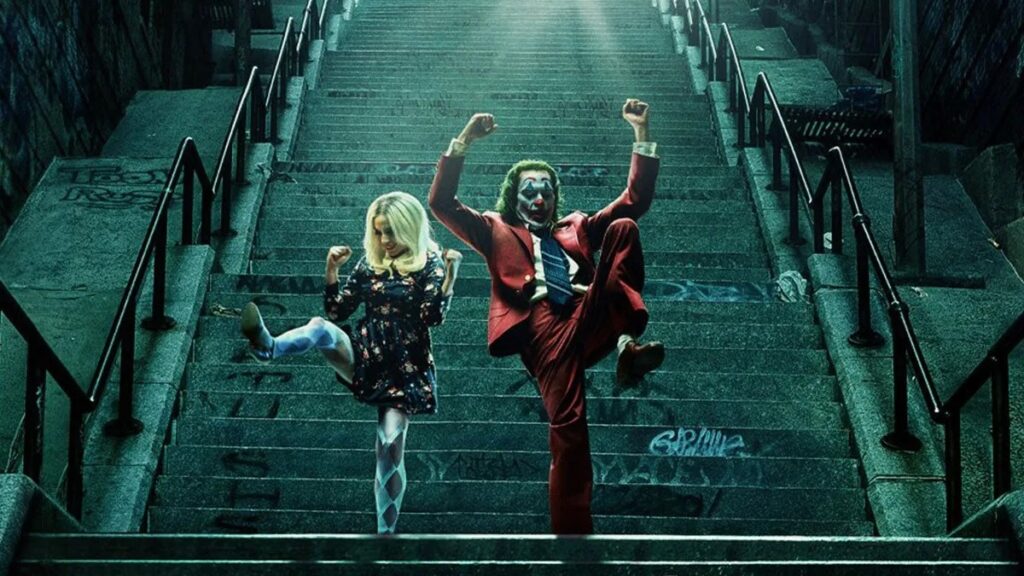by Hudson Moura
What has always struck me about the character in Joker (2019) is his unrelenting charisma in inspiring chaos and terror. In Joker: Folie à Deux, Todd Phillips amplifies this charisma to its breaking point, making it the core of the character’s identity and intricately linking it to the concept of fantasy. The film doesn’t merely expand on the themes of chaos and terror; it probes deeper into how this magnetic force shapes the Joker’s existence as a supervillain, questioning and broadening its significance within the story. The least that can be said about this film is that it is bewildering and disturbing, but that is precisely where its strength lies.
From the very first scenes, it becomes clear that this film is not merely a sequel to the first Joker, but rather an introspective commentary on madness, violence, and the search for identity. Todd Phillips, who initially began this exploration with Joker (2019), takes it further by questioning the very essence of superhero films and their deep connection to fantasy.
Joker 2: Folie à Deux subverts the typical superhero narrative by dismantling the traditional framework of good versus evil, instead delving into the blurred lines between heroism and villainy, sanity and insanity. Through this lens, Phillips challenges the fantastical elements that have long defined the genre, presenting a world where fantasy becomes a destructive force rather than a heroic one, ultimately questioning the place of superhero films in a modern cinematic landscape.
The use of musical elements—completely unexpected in a film like this, making Lady Gaga’s presence all the more fitting—plays a central role, adding a surreal and fantastical layer to an already chaotic narrative. This musical fantasy becomes the space where violence, murder, and madness are expressed. The contrast is one of the film’s great achievements, allowing viewers to navigate between Arthur Fleck’s insanity and the troubling reality of the world he inhabits.
The film raises profound questions about mental health, probing whether a person deemed insane can be held accountable for their actions, or if those actions arise from deliberate cruelty. Todd Phillips addresses this theme in a raw and direct manner, yet still leaves the audience grappling with society’s difficulty in discerning the fine line between insanity and cruelty. The Joker’s internal struggle is portrayed with greater intensity and complexity than in the first film, forcing viewers to confront the chaos of his fractured mind, once again powerfully embodied by Oscar-winner Joaquin Phoenix.

The film explores the character’s descent into madness and villainy while skillfully deceiving and challenging the audience’s expectations—particularly regarding the role of fantasy in superhero films.
One of the strengths of Joker: Folie à Deux lies in its ability to disturb. Very few viewers applauded at the end of the screening, not because they didn’t like the film, but because they were deeply shocked by the conclusion. The ending, difficult to reveal without diminishing its impact, is breathtaking. It’s unexpected, and raises questions not only about the character but also about the nature of violence in cinema itself. Does this conclusion signal the end of superhero films as we know them? The disappearance of fantasy in this film might be an early sign of that.
Unlike the first installment, Joker: Folie à Deux does not present raw or realistic violence. Instead, it seems almost like a commentary on the first film. While Joker explored explicit violence, Joker: Folie à Deux deals with the same themes more subtly, as though the second film critiques or reflects on the first. This directorial choice invites viewers to wonder whether this film is merely a continuation or a reimagining of its predecessor.
The war between madness and cruelty is ever-present, but it is distilled through violence that, while felt, is never shown excessively. The film explores the character’s descent into madness and villainy while skillfully deceiving and challenging the audience’s expectations—particularly regarding the role of fantasy in superhero films. Through this use of deception, the film prompts viewers to rethink their perceptions of entertainment, villainy, and the fine line between fantasy and reality, creating a more unsettling and introspective experience than what is typically expected in the genre. This subtle disillusionment makes Joker: Folie à Deux a deeply impactful and complex work, one that transcends the traditional boundaries of superhero films. It is undeniable that this disturbing and unexpected film will leave a lasting impression on those who dare to experience it.